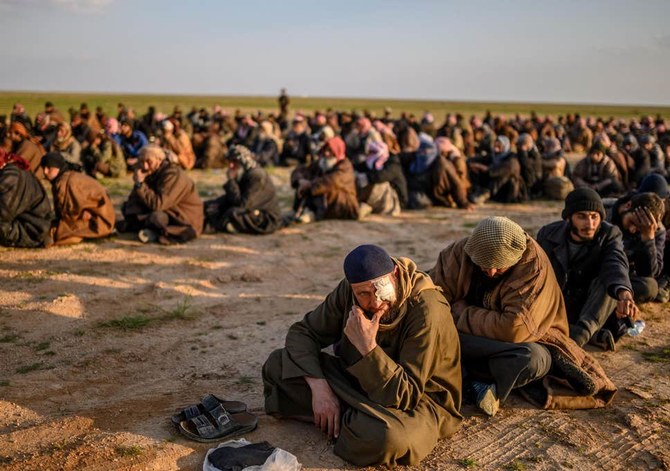
- ARAB NEWS
- 01 Jul 2025

Two different Christmas moments stand out this year in relation to Daesh. One was when the Assyrian community in Qara Qosh in Iraq was able to reclaim its tradition of burning a Christmas tree in the square outside the church that the group once captured and used for target practice. Its inhabitants had fled, but those who returned could worship in peace.
The second was a brutal Christmas Day massacre by a Daesh-affiliate in Nigeria, with 11 people executed, their throats slashed and one shot in the head. It was done apparently in revenge for the deaths Abu Bakr Al-Baghdadi, the former Daesh leader, and its former spokesman, Abu Al-Hasan Al-Muhajir.
Here lie the two possible divergent paths the group faces — a Daesh that is all but finished or one regenerating and every bit as dangerous as before, capable of phoenix-like re-emergence in all of its self-declared provinces.
The hard-line extremists that once ruled huge swathes of Syria and Iraq have had a disastrous 2019 at face value. Daesh has zero territory under its control, having abandoned its last bastion of resistance in eastern Syria in March. Baghdadi blew himself up rather than be captured during a US raid on his hideout in Idlib last October. All opinion polls indicate that in the Middle East at least, its brand of extremism is less and less popular.
Clearly any renaissance of the brand necessitates a major strategic and organizational effort to pick itself up from the mat after these knock-out blows. Speak to the US military and the line is pretty much that Daesh’s activity, such as it is, remains limited and impotent. It is akin to the final lashing out of a dying beast.
The commander of the US-led coalition forces in Iraq was clear: “These are people who are hiding out. They only come out at night to harass and take potshots. You can’t run a revolution or create your own caliphate if that’s all you do.”
Talk to local security officials in Syria, Iraq and the Kurdish areas, though, and another picture emerges. Far from being down and out, Daesh retains significant capabilities, including fighters and finance. Many members hide out in the non-governed areas in Iraq and Syria, such as the no man’s land between the Iraqi government territory and that of the Kurdish region. Sleeper cells in Raqqa are a deadly menace. Few envisage a return to 2014-16, when Daesh was at its height, but do fear it will present a potent threat as communities recover from its brutal rule.
Yet the massacre in Nigeria shows Daesh has other domains. The group in Afghanistan has also grown in strength, and is the most powerful franchise outside of Iraq and Syria.
Vitally for Daesh, all the ingredients for a resurgence are present in abundance. The massive protests in Iraq, where over 450 have died so far, highlight just how unpopular the existing political elite remain. Daesh and Al-Qaeda feed like parasites off such sentiment.
The anti-Daesh coalition is far from united. Back in October, when US President Donald Trump announced an immediate US withdrawal from Syria, the French Prime Minister Edouarde Philippe said: “This is devastating for our security, with the inevitable resurgence of Islamic State (Daesh) in northeastern Syria and probably also northwest Iraq, and so the destabilization of a government that doesn’t need that.”
Many feared that the Turkish invasion of Syria in October could see Daesh fighters and adherents break out of camps such as Al-Hol in Iraq. In all, some 30,000 Daesh fighters, many of them battle hardened with well-honed fighting skills, may be detained in prison camps in Iraq and Syria. This is one of the huge risks facing the counter-terrorist movement. Such camps are the perfect environment for radicalization and extremism.
At some point, unless they are wound up, Daesh will attempt to break its cohorts out of them. It may not be in any rush, as its leadership has always played a long game as opposed to the typical western penchant for short-term expediency.
Were Daesh to make a comeback, would it retain that name? Would it still wish to maintain the “caliphate” model and try to acquire and rule over territory? Or would it revert to a more Al-Qaeda style guerrilla strategy in keeping with its origins? Either way, it would be a massive embarrassment to Trump, who has hailed its defeat on many occasions.
Would he be willing to re-engage US troops on the ground and not just in the air? Would others in the anti-Daesh coalition still have the appetite? Could the decline in the US-Turkish relationship pose additional difficulties?
There are so many questions posed by this, and nothing in this struggle is inevitable, but perhaps one thing is close to certainty: If those fighting Daesh and its ilk continue along the same path, they will reap the same results.
Chris Doyle is director of the London-based Council for Arab-British Understanding. Twitter: @Doylech.